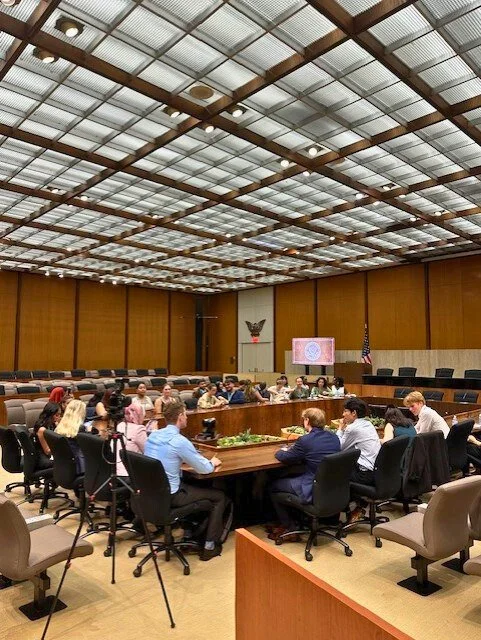AI, Rare Earths, and Aid at the Center of Trade, Global Business, and Diplomacy
By Cassie Hermiston-Boyd
In July 2025, I had the pleasure of attending the Young Diplomatic Forum (YDF) in Washington, D.C. The YDF is a London-based international platform that brings together young diplomats, foreign service officers, policymakers, and business and international affairs professionals from around the world. Its main aim is to help the next generation of diplomats, business professionals, and global leaders build skills, exchange ideas, and network across borders. I had the privilege of visiting respected institutions, hearing global perspectives across industries, and learning how AI is disrupting trade, global business, and diplomacy, especially in Africa and Latin America. We were hosted by the Johns Hopkins School of Advanced International Studies at their beautiful campus next to the Embassy of Canada and the Capitol building. I thoroughly enjoyed visiting the Library of Congress, the U.S. Department of State, the Organization of American States, and the World Bank Group (WBG). After spending one week in D.C., I walked away immensely inspired, more globally informed, and eager to give back to public service. It was an incredible "masterclass."
Top 4 things I learned at the Young Diplomatic Forum:
Artificial Intelligence Dominance: The country that is the leader in AI will largely control the future and dominate the global economy and political landscape. Regarding artificial intelligence, the U.S. is taking a more market-driven approach, the European Union is more regulatory, and China is more centralized. Wealthier countries can develop AI tools and deploy them faster than developing nations, which may create additional global imbalances and inequality. There must be a healthy balance between unleashing the power of AI and implementing a regulatory framework to protect citizens, our institutions, economy, and national security. It is also important for professionals and students to use AI as a tool, not a replacement for one’s critical thinking and individuality.
Rare Earth Minerals, Soft Power, and Global Development: President Xi of China is competing for a central role in the world and seeks to provide security, investment, humanitarianism, and trade, especially since the closing of USAID. U.S. defense and consumers are dependent on rare earth minerals found in Africa, which is where China has a stronghold. Also, Taiwan is the "microchip superpower," which is why protecting it is critical. The U.S. must re-establish a humanitarian agency or continue to deepen its relationship with the WBG in a capacity that serves mutual U.S.-global interests in areas of security, healthcare, education, and agriculture while acting as a soft power in all corners of the world. I visited the WBG on Day 4, and learned that they are one of the world’s largest sources of funding and knowledge for the developing world and work in over 170 countries.
A Focus on The Americas: On Day 4, I also visited the Organization of the American States (OAS), which was extra special since I was chosen to be an OAS U.S. Delegate at the Summit of the Americas in 2022. The OAS works in four languages: English, French, Spanish, and Portuguese. It consists of 35 member states with objectives that include: promoting democracy, protecting human rights, ensuring regional peace, promoting sustainable economic development, and combating corruption, crime, and drugs. OAS’s headquarters are rooted in history, culture, and symbolism. The building was funded by philanthropist Andrew Carnegie as a gesture to support peace and unity in the Americas.
Investing in Africa: Africa has the fastest-growing population in the world. By 2050, one in four people will be African. While the continent faces enormous challenges, there are a lot of opportunities. With proper investment in education and entrepreneurship, Africa can drive economic growth and global innovation. The African Growth and Opportunity Act (AGOA) is set to expire this year and is focused on mineral extractions. Since its enactment in 2000, AGOA has been at the core of U.S. economic policy and commercial engagement with Africa. AGOA provides eligible sub-Saharan African countries with duty-free access to the U.S. market for over 1,800 products and has a focus on rare earth mineral extraction. Major minerals include gold, lithium, cobalt, bauxite, and nickel. There were numerous questions around U.S. investment in Africa and sustainability.
Cassie Boyd is a MBA Candidate at Pepperdine University where she is focusing on global business and social impact. She is a Virtual Service Participant for the Peace Corps where she is remotely advising a business accelerator in Western Ukraine on social impact projects and global partnerships. She previously worked for Evacuate our Allies, an NGO that offers informational and humanitarian assistance to Afghan translators who were contracted with the U.S. military during the war. She also worked as a Project Manager with the Pacific Council on International Policy where she focused on programming and global engagement initiatives. As the Business Development Associate for London & Partners, the Mayor of London’s economic development agency, she attracted U.S. foreign investment to London and led trade missions post-Brexit.
The views and opinions expressed here are those of the author(s) and do not necessarily reflect the official policy or position of the Pacific Council.







